2016 United Kingdom European Union membership referendum
[12][13] At the May 2012 NATO summit meeting, UK Prime Minister David Cameron, Foreign Secretary William Hague and Ed Llewellyn discussed the idea of using a European Union referendum as a concession to the Eurosceptic wing of the Conservative Party.[14] On 20 June 2012, a three-clause private member's bill was introduced into the House of Commons by the then Eurosceptic MP Douglas Carswell to end the United Kingdom’s EU membership and repeal the European Communities Act 1972, but without containing any commitment to the holding of any referendum.Merkel stated in the German Parliament: "If you wish to have free access to the single market then you have to accept the fundamental European rights as well as obligations that come from it.The First Ministers of Northern Ireland, Scotland, and Wales co-signed a letter to Cameron on 3 February 2016 asking him not to hold the referendum in June, as devolved elections were scheduled to take place the previous month on 5 May.[125][126][127][128] The Cabinet of the United Kingdom is a body responsible for making decisions on policy and organising governmental departments; it is chaired by the Prime Minister and contains most of the government's ministerial heads.[165] Muhammad Ali Nasir and Jamie Morgan two British economists differentiated and reflected on the weakness of the Sterling due to the weak external position of the UK's economy and the further role played by the uncertainty surrounding Brexit[166] They reported that during the week of the referendum, up to the declaration of the result, exchange rate depreciation deviated from the long-run trend by approximately 3.5 per cent, but the actual immediate effect on the exchange rate was an 8 per cent depreciation."[196] Obama's intervention was criticised by Republican Senator Ted Cruz as "a slap in the face of British self-determination as the president, typically, elevated an international organisation over the rights of a sovereign people", and stated that "Britain will be at the front of the line for a free trade deal with America", were Brexit to occur.[197][198] More than 100 MPs from the Conservatives, Labour, UKIP and the DUP wrote a letter to the U.S. ambassador in London asking President Obama not to intervene in the Brexit vote as it had "long been the established practice not to interfere in the domestic political affairs of our allies and we hope that this will continue to be the case.[216] In March 2016, Nobel prize-winning economist Joseph Stiglitz argued that he might reconsider his support for the UK remaining in the EU if the proposed Transatlantic Trade and Investment Partnership (TTIP) were to be agreed to.[217] The German economist Clemens Fuest wrote that there was a liberal, free-trade bloc in the EU comprising the UK, the Netherlands, the Czech Republic, Sweden, Denmark, Ireland, Slovakia, Finland, Estonia, Latvia and Lithuania, controlling 32% of the votes in the European Council and standing in opposition to the dirigiste, protectionist policies favoured by France and its allies.The head of the IFS, Paul Johnson, said that the UK "could perfectly reasonably decide that we are willing to pay a bit of a price for leaving the EU and regaining some sovereignty and control over immigration and so on.[231] According to Simon Wessely, head of psychological medicine at the Institute of Psychiatry, King's College London – neither a special revision of the guidelines from 7 March 2016, nor Cameron's encouragement have made health organisations, willing to speak out.[231] The Genetic Alliance UK the Royal College of Midwives the Association of the British Pharmaceutical Industry and the Chief Executive of the National Health Service had all stated pro-remain positions by early June 2016.The Leave campaign argued that a reduction in red tape associated with EU regulations would create more jobs and that small to medium-sized companies who trade domestically would be the biggest beneficiaries.[259] The Leave campaign believed reduced immigration would ease pressure in public services such as schools and hospitals, as well as giving British workers more jobs and higher wages."[263] The Conservative MEP (Member of the European Parliament) representing South East England, Daniel Hannan, predicted on the BBC programme Newsnight that the level of immigration would remain high after Brexit.[286][287] and a debate on ITV held on 9 June that included Angela Eagle, Amber Rudd and Nicola Sturgeon for remain, Boris Johnson, Andrea Leadsom, and Gisela Stuart for leave.[288] EU Referendum: The Great Debate was held at Wembley Arena on 21 June and hosted by David Dimbleby, Mishal Husain and Emily Maitlis in front of an audience of 6,000.He claims the Council should have "sought judicial review of the constitutionality of the notification of the intention to withdraw” because depriving UK citizens to vote in the referendum is contrary to EU law.[307] The final result was announced on Friday 24 June 2016 at 07:20 BST by then-Electoral Commission Chairwoman Jenny Watson at Manchester Town Hall after all 382 voting areas and the twelve UK regions had declared their totals."[349] A teenager was subsequently convicted of manslaughter and sentenced to three and a half years in a young offender institution but the trial did not conclude that the altercation resulting in Jozwik's death was a hate crime.The petition had actually been initiated by someone favouring an exit from the EU, one William Oliver Healey of the English Democrats on 24 May 2016, when the Remain faction had been leading in the polls, and had received 22 signatures prior to the referendum result being declared.[353][354][355] On 26 June, Healey made it clear on his Facebook page that the petition had actually been started to favour an exit from the EU and that he was a strong supporter of the Vote Leave and Grassroots Out campaigns.[361] Home Secretary Theresa May made the following comment when announcing her candidacy to replace Cameron as Conservative leader (and hence as Prime Minister) on 30 June: "The campaign was fought ... and the public gave their verdict.[389][390] In February 2017, the Electoral Commission announced that it was investigating the spending of Stronger in and Vote Leave, along with smaller parties, as they had not submitted all the necessary invoices, receipts, or details to back up their accounts.[392][393] On 4 March 2017, the Information Commissioner's Office also reported that it was 'conducting a wide assessment of the data-protection risks arising from the use of data analytics, including for political purposes' in relation to the Brexit campaign.[395] In November 2017, the Electoral Commission said that it was investigating allegations that Arron Banks, an insurance businessman and the largest single financial supporter of Brexit, violated campaign spending laws.[413] In April 2017, the House of Commons Public Administration and Constitutional Affairs Select Committee (PACAC) issued a report suggesting that there were technical indications that a June 2016 crash of the voter-registration website was caused by a distributed denial-of-service attack using botnets.[416] In November 2017, the Electoral Commission told The Times that it had launched an inquiry to "examine the growing role of social media in election campaigns amid concerns from the intelligence and security agencies that Russia is trying to destabilise the democratic process in Britain".[421] Three months later, Information Commissioner Elizabeth Denham, who had decided to look into potential unlawful marketing involving repurposing of data during the referendum, produced her final report.






Leave
Remain
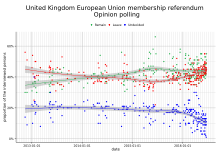
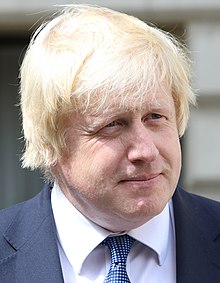
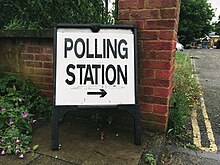

Leave
Remain
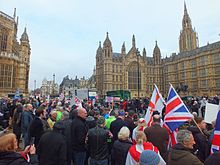

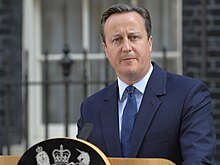

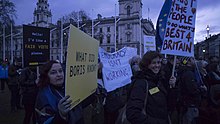


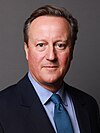
The United Kingdom votes to leave the European UnionBrexitNational and regional referendumsUnited Kingdomconstituent countriesNorthern Ireland border pollEC membership referendumScottish devolution referendumWelsh devolution referendumGreater London Authority referendumNI Good Friday Agreement referendumNE England devolution referendumAlternative Vote referendumScottish independence referendumWithdrawalEuropean UnionGlossary of termsEuropean Communities Act1975 EC membership referendumUK rebateBruges speechNo. No. No.Maastricht RebelsBlack WednesdayEuropean Union (Amendment) Act 2008European Union Act 2011UK opt-outs from EU legislationEuroscepticism in the UKUK opinion polling on EU membershipPeople's PledgeLabour for a ReferendumBloomberg speech2013–14 EU (Referendum) Bill 2014 European Parliament electionClactonHeywood and MiddletonRochester and Strood2015 UK general election2015–16 EU membership renegotiationEU Referendum ActGibraltarEU Referendum (Date of Referendum etc.) RegulationsEU Referendum (Conduct) RegulationsIssuesEndorsementsOpinion pollingUK Government pro-EU leafletCampaignsVote LeaveBusiness for BritainConservatives for BritainBeLeaveLeave.EUBpopliveThe Freedom AssociationBetter Off OutGrassroots OutLabour LeaveGet Britain OutBruges GroupCampaign for an Independent BritainBritain Stronger in EuropeLabour In for BritainEuropean Movement UKBritain in EuropeBritish InfluenceBusiness for New EuropeNucleusProject FearResultsCauses for resultInternational reactionsImmediate aftermath2016 Conservative Party election2016 Labour Party election2016 UKIP electionDepartment for Exiting the EUDepartment for International TradeAllegations of unlawful campaigningAlleged Russian interferenceNotice of withdrawalArticle 50 processMiller case (Article 50)EU (Notification of Withdrawal) Act 2017Brexit planRepeal Bill plan2017 UK general electionNegotiationsEU negotiation mandateChequers agreement2019 European Parliament election2019 UK general electionWithdrawal agreementBrexit divorce billFish for financeIrish backstopNo-deal BrexitNorthern Ireland ProtocolNorthern Ireland Protocol BillWindsor FrameworkLegislationWithdrawal Act 2018Nuclear Safeguards Act 2018Cooper–Letwin ActBenn Act2019 suspension of rebel Conservative MPsPublic Vote BillTerms of Withdrawal BillsScottish EU Continuity BillWithdrawal Agreement Act Scottish EU Continuity ActInternal Market ActEU (Future Relationship) ActRetained EU Law (Revocation and Reform) BillImpactImpact on the Irish borderGood Friday AgreementImpact on the EUEconomic effectsEffects on GibraltarScientific cooperationEffects on popular cultureRetained EU law2021 Jersey disputeEU–UK relationsRelations pre- and post-Brexit